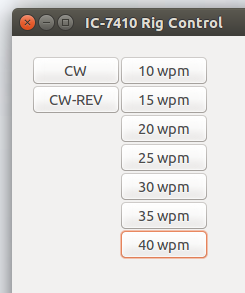Perhaps a set of buttons are easier to use than a slider for changing the key speed.
struct mybutton mybuttons[100] = {
{"CW", 0, 1, 0, 1},
{"CW-REV", 0, 1, 1, 2},
{"10 wpm", 1, 2, 0, 1},
{"15 wpm", 1, 2, 1, 2},
{"20 wpm", 1, 2, 2, 3},
{"25 wpm", 1, 2, 3, 4},
{"30 wpm", 1, 2, 4, 5},
{"35 wpm", 1, 2, 5, 6},
{"40 wpm", 1, 2, 6, 7}
}
for(int i=0;i<nbutton;i++) {
button = gtk_button_new_with_label (mybuttons[i].name);
gtk_signal_connect (GTK_OBJECT (button), "clicked", GTK_SIGNAL_FUNC (callback),
(gpointer) mybuttons[i].name);
gtk_table_attach_defaults(GTK_TABLE(table), button,
mybuttons[i].left_attach, mybuttons[i].right_attach,
mybuttons[i].top_attach, mybuttons[i].bottom_attach);
gtk_widget_show (button);
}
First you define lots of buttons, their labels and locations. IF one of the buttons is “clicked”, a callback routine is called.
void callback( GtkWidget *widget, gpointer data ) {
gint wpm;
if(g_str_has_suffix((char *)data, "wpm")) {
wpm = atoi( g_strndup((char *) data, 2) );
set_cw_speed(wpm);
}
}
If the label of a button ends with “wpm”, we have to change the key speed according to the first two digits.
void set_cw_speed(int wpm) {
int outputcount = 9;
static unsigned char command1[9] = {0xfe, 0xfe, 0x80, 0xe0, 0x14, 0x0c, 0x00, 0x32, 0xfd};
int iii, i100, i10, i1;
if(wpm < 6) wpm = 6;
if(wpm > 48) wpm = 48;
iii = 255 * (wpm - 6) / (48 - 6);
i100 = iii / 100;
i10 = (iii - 100*i100) / 10;
i1 = iii % 10;
command1[6] = i100;
command1[7] = 16*i10 + i1;
write(fd, &command1, outputcount);
}
Conversion from “wpm” to a command parameter is necessary. See IC-7410 Keyspeed for the details.

